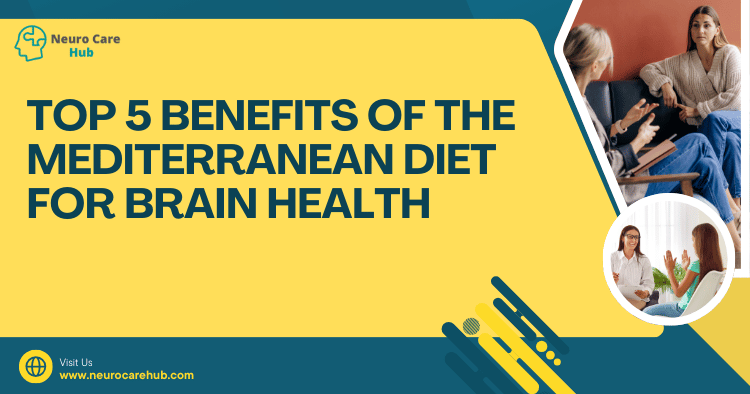Table of Contents
- Introduction
- 1. Rich in Antioxidants
- 2. Supports Healthy Brain Aging
- 3. Enhances Memory and Cognitive Function
- 4. Reduces Risk of Neurodegenerative Diseases
- 5. Promotes Heart Health, Benefiting the Brain
- Conclusion
- FAQs
Introduction
In recent years, the Mediterranean diet has garnered attention for its significant health benefits, particularly concerning brain health. This dietary pattern, inspired by the traditional eating habits of countries bordering the Mediterranean Sea, is abundant in fruits, vegetables, whole grains, nuts, and healthy fats. The latest studies in 2024 continue to support its positive impact on cognitive function and overall brain health. In this article, we will explore the top five benefits of the Mediterranean diet for brain health, encouraging you to embrace this nutritious and flavorful way of eating.
Did you know? The Mediterranean diet is not just about food; it’s a lifestyle that includes physical activity and social gatherings around meals!
1. Rich in Antioxidants
A hallmark of the Mediterranean diet is its rich supply of antioxidants. Foods such as berries, leafy greens, nuts, and olive oil are loaded with these powerful compounds, which help combat oxidative stress in the brain—a condition linked to neuronal damage and various neurodegenerative disorders.
Why Antioxidants Matter
Antioxidants neutralize free radicals—unstable molecules that can cause cellular damage. A diet high in antioxidants may lower inflammation and decrease the risk of chronic diseases, including Alzheimer’s and Parkinson’s. For specific insights on neuro care and antioxidants, check out Top 5 Essential Insights on Neuro Care You Need to Know.
“Antioxidants are like the body’s defense team, protecting against the harmful effects of oxidative stress.”
Table: Antioxidant-Rich Foods in the Mediterranean Diet
| Food | Antioxidant Type | Benefit |
|---|---|---|
| Blueberries | Flavonoids | Improve memory |
| Spinach | Vitamins C & E | Protect brain cells |
| Walnuts | Omega-3 fatty acids | Reduce inflammation |
| Olive Oil | Polyphenols | Improve brain function |
2. Supports Healthy Brain Aging
Maintaining brain health becomes increasingly crucial with age. The Mediterranean diet is recognized for its anti-inflammatory properties, which can help support healthy aging. Studies in 2024 demonstrate that individuals who adhere to this diet experience a slower rate of cognitive decline compared to those who do not.
Key Components for Aging Well
The inclusion of omega-3 fatty acids from fish and nuts, combined with a high intake of fruits and vegetables, provides essential nutrients that promote brain health. These nutrients are vital for forming new neural connections, crucial for memory and learning. For more insights on brain aging, consider exploring Top 5 Benefits of Regular Neuro Check-Ups for Your Health.
“Healthy eating is a key ingredient to aging gracefully and maintaining cognitive function.”
3. Enhances Memory and Cognitive Function
The Mediterranean diet has been linked to improved memory and cognitive functioning. Recent research published in Frontiers in Nutrition highlights that participants who follow the Mediterranean diet exhibited better memory and cognitive performance than those on a typical Western diet.
How It Works
The combination of healthy fats, antioxidants, and nutrient-dense foods in this diet promotes better blood flow and oxygenation to brain cells, enhancing cognitive function. Furthermore, the social aspect of shared meals in Mediterranean cultures provides emotional benefits that further support brain health. For additional information on enhancing memory, see Top 5 Ways Family Support Enhances Neuro Recovery.
“Food for thought: The act of sharing meals with family and friends can significantly boost mental well-being!”
4. Reduces Risk of Neurodegenerative Diseases
Research continues to suggest that a Mediterranean diet can significantly lower the risk of neurodegenerative diseases such as Alzheimer’s and dementia. A longitudinal study published in The Journal of Nutrition, Health & Aging found that individuals adhering to this diet had a 40% reduced risk of developing Alzheimer’s disease.
Protective Factors
Key components like high consumption of omega-3-rich fish and olive oil contribute to this protective effect. These foods are believed to help reduce amyloid plaques associated with Alzheimer’s disease. For insights on neurological disorders, refer to Top 5 Neurological Disorders Impacting Mental Health.
“Eating well today could mean fewer health challenges tomorrow, especially for your brain.”
5. Promotes Heart Health, Benefiting the Brain
The Mediterranean diet is well-known for its heart-healthy benefits, which directly translate to brain health. A healthy heart ensures good blood circulation, supplying the brain with the oxygen and nutrients it needs to function optimally.
Interconnectedness of Heart and Brain Health
A diet rich in healthy fats, whole grains, and fruits can lower bad cholesterol levels and blood pressure, decreasing the risk of stroke—a significant risk factor for cognitive decline. Eating Mediterranean-style can be a flavorful way to protect both your heart and brain. For more on integrating neuro care into your wellness routine, check Top 5 Ways to Integrate Neuro Care into Wellness Routine.
Visual Element: Heart and Brain Health Connection
| Component | Heart Health Benefit | Brain Health Benefit |
|---|---|---|
| Olive Oil | Lowers cholesterol | Protects brain cells |
| Fatty Fish | Reduces inflammation | Enhances cognition |
| Fruits and Vegetables | Lowers oxidative stress | Supports neural health |
“When it comes to health, what’s good for the heart is often good for the brain too!”
Conclusion
The Mediterranean diet is more than just a culinary trend; it’s a lifestyle choice that offers numerous benefits for brain health. With its rich array of antioxidants, support for healthy aging, enhancement of cognitive function, reduction of neurodegenerative disease risk, and promotion of heart health, this diet serves as a powerful ally in maintaining and improving brain health.
If you’re looking to enhance your brain function while enjoying flavorful meals, the Mediterranean diet may be the perfect fit for you. Explore more on this topic in Neuro Care: A Guide to Brain Health.
“Healthy eating isn’t about strict limitations; it’s about feeling great, having more energy, and improving your health.”
FAQs
1. Is the Mediterranean diet difficult to follow?
Not at all! The Mediterranean diet is based on whole, fresh foods and can be easily adapted to your taste and lifestyle. It emphasizes variety, making it enjoyable and sustainable.
2. Can I still eat pasta on a Mediterranean diet?
Yes! Whole grain pasta is a staple in the Mediterranean diet. Just be sure to pair it with plenty of vegetables and healthy fats like olive oil.
3. How quickly can I see the benefits of the Mediterranean diet?
While individual results may vary, many people notice improvements in their energy levels and mood within a few weeks. Long-term benefits for brain health may take months or years to fully realize.
4. Do I need to give up all other foods?
Not necessarily. The Mediterranean diet encourages moderation. You can still enjoy your favorite foods while prioritizing Mediterranean staples.
5. Where can I find recipe ideas?
Check out Mediterranean Living for a wealth of recipes and tips on following the Mediterranean diet.
Embrace the Mediterranean diet today and reap the benefits for both your body and mind!






